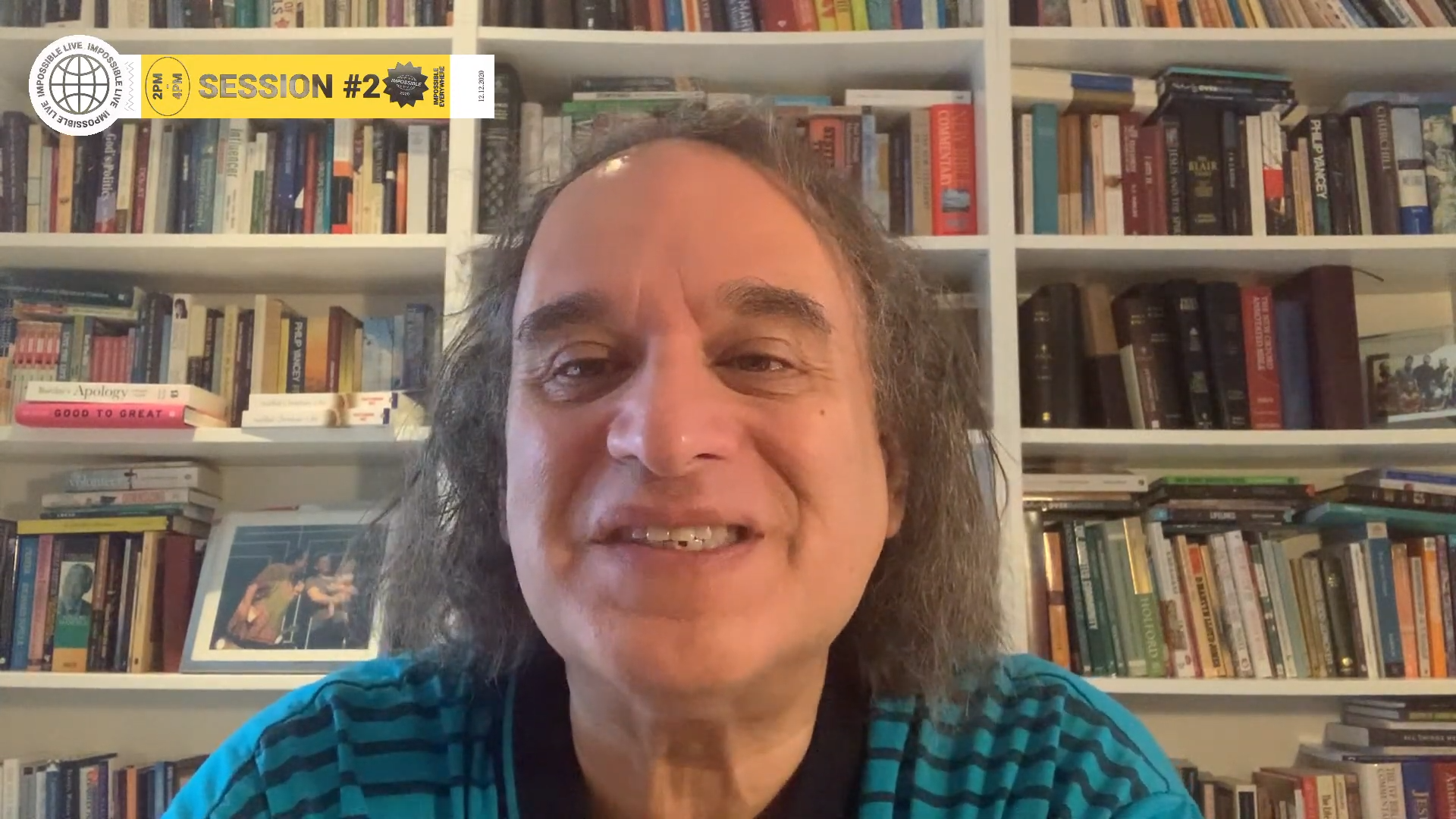Mike Pilavachi, founder of the Soul Survivor youth music festivals, had a simple message for the Impossible Online Conference 2020.
The God of the impossible loves you.
Speaking from his home in Watford, England, Pilavachi began: “The trouble is, I meet many young people all the time, including Christian young people, who don’t know how much they’re worth and how much they’re loved.
“Many of us walk around with the wrong label. We walk around with a label we gave ourselves, or a label that was given to us in school, or a label that was given to us by our parents.
“Some of us carry labels like, ‘I’m not clever enough’ or ‘I’m not good looking enough’. But Jesus chose us. He chose not because of what we are but simply because He loves us. And in His love, He heals us and remakes us.”
BROKEN DISCIPLES
To unpack what Jesus’ love looks like and how it remakes us, Pilavachi took a unique and unorthodox look at Jesus’ disciples, beginning by noting that Jesus did not pick from the “best of the best” for His disciples.
Unlike the rabbis of Jesus’ time – who Pilavachi shared would only choose disciples from the best rabbinical universities – Jesus went to the Sea of Galilee and picked out the imperfect and unlikely as His disciples instead.
“Honestly, if I were Jesus’ advisor, I would have asked Him: ‘What on earth are you doing?'” he quipped.

The 62-year-old humorously listed examples to show just how imperfect the disciples were: Matthew was a tax collector and traitor to his fellow Jews, Simon was a “freedom fighter terrorist” and Thomas was a “depressive” pessimist.
Then, zooming in on John the disciple, Pilavachi raised three instances that further reflected John’s imperfections.
The first, in Mark 10:35-40, showed John’s “selfish ambition” when he asked Jesus if he and James could someday sit at Jesus’ right hand.
Pilavachi noted that this request was made immediately after Jesus had told His disciples – John included – that He would soon be dying a horrible death on the cross.
And yet, instead of saying something nice or even logical, they asked: “After You’ve died that horrible death on the cross and risen from the dead, can we have the glory with you? Can we sit at your right hand and your left hand?”
Pilavachi continued, reading from Luke 9:51-56, where Jesus had sent out some disciples to a Samaritan village to get some things but was turned away.
Hearing that the Samaritans had denied them these things they asked for, John asked Jesus: “Lord, do you want us to call fire down from heaven to destroy them?”
From John’s response, Pilavachi suggested that John was also “vengefully violent”.
Pilavachi then reminded the audience that James and John had, after all, been nicknamed “sons of thunder” (Mark 3:17) because they were well known for their bad tempers.

Lastly, Pilavachi shared that John was also “excessively competitive”.
Pointing to John 20:3, Pilavachi noted that John had made it a point to include – in his own gospel – that he was the first to reach Jesus’ tomb because he was able to run faster than Peter.
“Now folks, this is the pivotal moment of the whole story of the Bible,” Pilavachi said. “Jesus has died on the cross for our sins and they are just discovering that He has risen from the dead.
“But at this crucial moment, John felt that it was necessary to tell us that he was a faster runner than Peter! I mean it’s crazy, because who cares about that?”
“And yet, here’s the amazing thing – Jesus still chose him and said ‘John, follow me,'” emphasised Pilavachi.
“Despite all of who John was, Jesus picked him and poured Himself into John’s life, along with all the other disciples, for three years.”
Pilavachi declared that God is the God of the impossible, and that He wants to do the impossible through us.
But that real and radical change must also start first with us – from within. “Before Jesus wants to use us to change the world, He wants to come and change us, to make us more like Him,” he said.
And that was exactly what Jesus did with John. Pilavachi looked back to how John had started off with the label as a “son of thunder”.
This was a label with a negative connotation, the very sort that many of us carry around. But by the time John had spent three years with Jesus, he would have taken on a new label: “The beloved disciple. The one Jesus loved” (John 20:2).
Pilavachi’s point was that our old labels cease to matter once we know whose we are. And the moment we know whose we are is when incredible things can start to happen.
“Jesus invested for three years in broken people and at the end, those 12 guys and some others changed the world. They did the impossible and lived the impossible because the God of the impossible lived in them.
“And He wants to use you. But first of all, He wants to fill you with His love so you are healed and set free.”
BROKEN AND BELOVED
During his sermon, Pilavachi also shared a moving story told to him by his friend, Anthony, about him and his daughter.
Anthony’s daughter, who was around five or six at the time, had a favourite porcelain doll: “Before bedtime, Anthony would take the doll from the mantlepiece so that his daughter could stroke and kiss the doll goodnight.”
It was something of a beloved family tradition for Anthony’s daughter. But one day, Anthony and his daughter were engaged in a particularly competitive pillow fight when he accidentally knocked over the porcelain doll with his pillow.
It fell and shattered into pieces.

Anthony’s little girl looked at him with tears in her eyes and told him that he had “killed her dolly”.
The distraught dad apologised and offered to buy his daughter a new doll, but she only said: “Daddy, I don’t want another one, I only want this one.”
Eventually, Anthony picked up all the pieces and glued the entire doll back together. However, it still wasn’t perfect. In fact, it was horribly disfigured.
Anthony took the doll to his daughter and said: “Here’s your doll. I’m so sorry, I promise you that I’ll buy you another one.”
But she persisted that she only wanted this doll. “But darling, this one’s broken,” Anthony told her.
She looked at him and said, “Just because she’s broken doesn’t mean I can’t love her.”

That, Pilavachi shared, was God’s message from him to the conference’s attendees.
“Just because you’re broken doesn’t mean God can’t love you,” he urged. “And just because you’re broken, it doesn’t mean He can’t change you.
“God loves you and He chooses you. He wants to come and heal you with His love, and He wants to change the way you see yourself.
Finally, Pilavachi closed with a special prayer for the viewers: “John realised how much he was worth, so he gave himself a new label.
“My prayer for you is that you would receive a new label; that you would know who you are because you know whose you are.”
Look out for more coverage on the Impossible Online Conference 2020 on Thir.st over the next few days!
- What are some labels that have been put on you? Have you come to believe them?
- Putting those labels aside, what does God really say about you?
- Who’s someone you know who really needs to hear that God loves them? Drop them a message to share just that!









